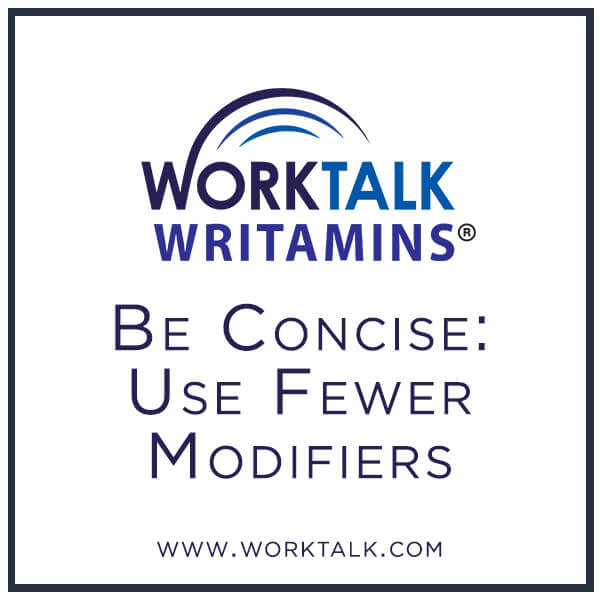
In a time of intense blathering, conciseness counts. When you make a point succinctly, people listen to you. They respect you. They might even believe what you say.
In the next three Writamins, I will introduce tools from the Worktalk training that support you in tightening up your writing so that you are the person that others turn to for clarity. This Writamin focuses on modifiers.
Use Fewer Modifiers.
The best way to kill an idea is to use too many words to describe it. Really, really, truly, I’m not kidding here, I’m serious, you’ve got to understand that over-stating is worse than under-stating. One way to discipline ourselves to brevity is to use fewer adjectives, adverbs, cute descriptive phrases, and other modifiers.
What is a Modifier?
Surprise: A modifier modifies, or describes, another word or phrase. Adjectives and adverbs are modifiers. Phrases can be modifiers, too.
For example:
Girl is a noun (a person, place, or thing) that has no modifiers. The charming, intelligent, brown-haired girl has adjectives modifying the word girl.
Wrote is a verb (action word) without modifiers. Wrote stirringly, eloquently, clearly, has adverbs modifying wrote.
And there’s the famous Groucho Marx joke: “One morning, I shot an elephant in my pajamas. How he got into my pajamas I’ll never know!” In this case, the misplaced modifier is the phrase in my pajamas. Many jokes use misplaced modifiers to create humor.
Are Modifiers Bad?
Modifiers are like medicine: Using the right amount at the right time can create miraculous results. The trick is not to use them when you do not need them. For example:
| Justified Modifiers | Unjustified Modifiers |
| The parties’ fully executed written agreement | Advance reservations |
| Clearly explained | Resume again |
| 2020 fee-sharing policies | Stunningly simple, accurately stated legal opinion |
| Push hard | Brief summary |
How Many Modifiers Are Too Many?
It depends. In general, use no more than two adjectives per noun and one adverb per verb.
So, a tall, beautiful girl might squeak by, but a tall, beautiful, willowy, intelligent girl is over the top. Similarly, to say, “He spoke eloquently about the project,” would be fine. But if we get to, “He spoke eloquently, movingly, absolutely brilliantly about the project,” then once again, you’ve got a dud.
Novelists and essay writers may be able to use extra modifiers, but for business writers, conciseness is key. Choose each noun and verb wisely and you’ll have less need to overdo the modifiers.
Adjectives and adverbs are tempting in their ability to describe actions or things; however, it pays to use self-control when using these modifiers.
Less is More
Words that describe things and actions enrich our writing immensely. When employed judiciously, they spice up our writing and add verve to our descriptions. Using too many, however, drowns our ideas in a sea of verbiage and works against our purpose for writing: To convey our ideas clearly to our readers.
Was I Clear?
Did I convey this idea clearly to you? Please reply
- Yes!
- No.
- Kind of
to lizd@worktalk.com. If I wasn’t clear, I can always use more words to make my point.

©2020 Elizabeth Danziger All rights reserved
Take me to your leader! Communication woes drain the lifeblood from an organization. Connect me with your decision-makers and see how Worktalk can transform communication in your world. Contact me at lizd@worktalk.com or 310.396.8303.
